pofc
Prisoners of Conscience
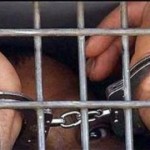

Welcome to my new website.
UN calls for investigation into human rights violations Balsudanketb on 26.06.2011 by jem UN calls for investigation into human rights violations in Sudan Khartoum - Sudan Tribune - A senior official at the United Nations that the fires are still burning in the huts and thieves still roam the main town in Sudan's disputed Abyei after more than a month to control by Khartoum and closed joint administration between the north and south. Here, said Kyung Kang Deputy UN High Commissioner for Human Rights that must be investigated "thoroughly" in Abyei and the other border between north and south in conflict forced the fighting broke out weeks ago, tens of thousands to flee. "We would like such an opportunity in the entry permit but so far very limited." She added that thousands of residents who had fled from Kadugli and the surrounding area for shelter near the headquarters of the UN mission in Sudan returned to their homes but there are doubts about their return voluntarily. They revealed that the team asked to visit South Kordofan in Sudan, part of a tour before the secession of the South in the ninth of July, but has not received a reply yet. "It requires a thorough investigation Kadugli now .. The more that is sooner, the better. " Accused the rights groups and church groups Khartoum to crack down on the Nuba in South Kordofan, a northern state because of their support for the South. Officials declined to Sudan in the north of the allegations and said that the baseless and politically motivated. And imposed restrictions on flights to the United Nations over southern Kordofan substantially and international organization said it would offer its assistance in the distribution of risk. South Sudan will become an independent state within more than two weeks, but clashes along the border is well demarcated raised fears of a return to civil war between north and south, such as those that claimed the lives of more than two million people over the decades until it ended in 2005.
UN Security Council voted to send 4,200 to Abyei (AFP) - 21 hours ago NEW YORK (AFP) - The UN Security Council on Monday unanimously adopted a decision to send a peacekeeping force of 4,200-strong Ethiopian to the Sudanese region of Abyei dispute in the hope of maintaining peace with the approaching date for declaring the independence of South Sudan. It will be an important force in this part of the peacekeeping operation, monitoring the withdrawal of forces from Khartoum, Abyei, and verification, as well as ensuring respect for human rights in this region on the border between north and south Sudan. It also will facilitate the distribution of humanitarian aid. The troops occupied the north of Abyei in May 21 that resulted in the displacement of more than 100 thousand people to the south. On June 20 signed the Sudanese government and the Government of Southern Sudan provides for an agreement to make this the demilitarized zone. And demands that Sudan's north and south as well as control of Abyei. The UN Security Council expressed its "extreme concern about the current situation in the Abyei area and over all acts of violence committed against civilians in violation of international humanitarian law and human rights law, including killings and the displacement of a large number of civilians." The final status of Abyei, one controversial subjects that require a solution before he officially declared its independence in the South July 9 under an agreement signed in 2005 and put an end to civil war has left nearly two million people. He said the Sudanese ambassador to the United Nations to pay Al-Haj Ali Osman Khartoum forces would withdraw as soon as the spread of Ethiopian troops. He described the French ambassador at the United Nations Gerard Arrow important part of the blue hats with "strong," saying he would allow investigations into human rights violations. The U.S. Ambassador to the United Nations, Susan Rice, "a few days before the date of the independence of South Sudan, it is necessary to bear the leaders of Sudan and Southern Sudan, their responsibilities," adding "The government of Sudan to avoid any escalation of the crisis and stop immediately its military actions." And called for help the High Commissioner for Human Rights at the United Nations Kyung-wha Kang today after a visit to Sudan a week of an investigation as soon as possible about human rights in Abyei and South Kordofan. She said that "the devastation that I saw in Abyei is a scary warning that it could become a border area. Some of the huts were still burning during my visit there, the robbers searched the rubble in the presence of Sudanese troops." The resolution states that the UN force to protect the security of the interim Abyei civilians with the "protection of the Abyei area of any infiltration of the elements are not allowed." Has organized a referendum in southern Sudan last January voted massively to secede from the north. Abyei did not participate in the referendum because the parties failed to reach agreement on who is eligible to vote. Will participate Sudanese President Omar al-Bashir, as well as UN Secretary-General Ban Ki-moon and other international leaders in the South Sudan Independence ceremony on the ninth of July will also stressed the Ambassador of Sudan as well.
27/06/2011 at 15:15 GMT International Criminal Court issued a note Monday the arrest of Colonel Gaddafi of Libya on charges of crimes against humanity in Libya. The arrest warrant also include Saif al-Islam, son of Libyan leader, Abdullah Sanusi head of Libyan intelligence. Court judges said that Gaddafi is required for planning and oversight of the killed and injured and the arrest and detention of hundreds of civilians during the first 12 days of the uprising aimed at toppling him from power. Gaddafi is accused also of trying to cover up the crimes charged. Court's decision came in response to the request of the Prosecutor Luis Moreno - Ocampo, the sixteenth of last month. Ocampo accused Gaddafi, Saif al-Islam and Alsnusona of committing war crimes and crimes against humanity in Libya since mid-February last year. Murder, persecution and accusations between the commission of murder, persecution amounted to crimes against humanity by the Libyan security forces against civilians, especially in the capital cities of Tripoli and Benghazi and Misurata. The prosecutor accuses Gaddafi as a "promising a plan to suppress the popular demonstrations in February and by all means including the use of excessive violence and bloodshed." Ocampo investigations indicate that the "security forces pursued a policy of generalized and systematic attacks on civilians are considered dissidents in order to keep the authority of Gaddafi." Saif al-Islam also accused of recruiting mercenaries to help in the face of the intifada that broke out against the regime of his father. The most important aide to al-Sanusi al-Qadhafi and his brother in law, the Attorney General Vihmh organized attacks on demonstrators. Campaign is continuing its part, Britain confirmed its determination to continue to campaign NATO Neto in Libya. The defense minister said Liam Fox told the BBC Monday that Britain can not afford the financial cost to participate in the campaign no matter how long standing. The Fox, "are ready to move in military operations, we are able to continue and will do so as long as necessary. The controversy has been raised in Britain about the ability of the budget to afford the cost of British participation in military operations in light of the financial crisis and economic crisis. Politically, Fox said that Gaddafi gave up close to him a matter of time. He expressed his belief that the increasing isolation of the Libyan regime.
Must be investigated attacks on Sudanese security officials the right of students and to prosecute those responsible
MARCH 4, 2011 These serious allegations clearly show that the National Security Agency still uses torture and harassment to silence the opposition. Sudanese authorities need to take immediate action to stop torture and ill-treatment and harassment practiced by the National Security Agency.
Daniel Bekele, Head of Africa at Human Rights Watch (New York) - reported Human Rights Watch that officials in the Sudanese security service practiced severe forms of physical torture and sexual abuse of large numbers of Sudanese youth protests after the January and February 2001 the last two. According to the testimonies of personal information obtained by Human Rights Watch, expose students and young people who had been arrested, and some of them did not exceed the age of 18 years, severe forms of beatings, electric shocks and other attacks reach the level of torture. And the involvement of security officials in the rape of a girl from activists last February.
The Human Rights Watch that the Sudan has publicly condemned the use of torture, including sexual violence and other forms of torture committed by officials in the National Security Agency after the recent protests. And must make an immediate investigation into these crimes and the courts of those responsible. The Sudanese Government should also release those still in detention immediately or brought to trial while ensuring full respect for their rights as detainees.
Said Daniel Bekele, Head of the African Human Rights Watch, "These serious allegations clearly show that the National Security Agency still uses torture and harassment to silence the opposition. He Beckel said," The Sudanese authorities need to take immediate action to stop torture and ill-treatment and harassment practiced by National Security Agency. "
Torture and ill-treatment
Al Human Rights Watch, said riot police and Sudanese national security forces used excessive violence to quell peaceful demonstrations, inspired by the popular uprisings in both Tunisia and Egypt. Authorities have arrested more than 100 people during the days 29 and 30 and Jan. 31 in Khartoum and Omdurman.
In spite of that the authorities of the police and the National Security Agency released a lot of rational within hours of their arrest, the officials of the National Security Service detained dozens of complex security offices in Khartoum sea for weeks, some of whom underwent arrest in cages arrest temporary and others in the large rooms, and detainees have said to Human Rights Watch that they had been beaten and sleep deprivation, electric shock, as well as other forms of physical assaults and psychological, including threats of murder and rape.
Presented Yusuf Mehdi, 27, son of opposition leader from the party of the Sudanese security, arrested, blindfolded, and forced to sit on his knees facing the wall and severely beaten Balsaik, batons and whips. Mahdi said the Human Rights Watch that he heard "screams of agony" of the other detainees in the same building, and see also, according to him, the injuries they have suffered.
Mahdi said that the young men who were arrested, and some of them did not exceed 18 years of age, had been subjected to severe beatings. He also said he saw traces of blood on their shirts, and also said they were mounting through crawling and, in reference to their inability to walk because of the beating they suffered.
Another student said, on condition of anonymity, said he was arrested in a public square in Khartoum this morning on February 3, remained in custody in the sea for two weeks.
This student also said: "Many subjected to severe beatings, torture, cruel, and they were screaming throughout the night." He added: "Some of them subjected to electric shocks or beaten with sticks and Sikhs. I saw two badly beaten they were being required for treatment in hospital."
He was arrested by security agents three weeks following the protests after the authorities accused them of student activists participating in organized protests or attacks to detect the elements of national security detainees.
Were arrested Ali Mohamed Osman, is a student and a member of the Sudan Liberation Movement, the night of 14 February, and was carrying leaflets calling for the release of protesters who were arrested by security authorities. Osman was arrested by elements of the National Security Service in Omdurman and underwent interrogation lasted for more than 24 hours.
, "Othman told Human Rights Watch that security agents blindfolded him and took him by car to a detention center, where he was threatened and he was interrogated and beaten on his back and shoulders with batons and water cannons, plastic and forced to stand throughout the night. Cause the battery to the vulnerability of Osman serious injuries that required medical care immediately after his release.
And those who were released by Human Rights Watch that the National Security Service officials were forced detainees to sign before being released on the statements pledging not to participate in any further protests or even just talking about the situation in prisons. And forced many of the detainees disappeared after being released for fear of retaliation. Officials have tried in the National Security Service arrested twice Osman again after speaking publicly about the abuse he suffered during his arrest. He said detainees were released that another activist was arrested for the second time, which is now in custody, after the publication of information on the site "Facebook" on what he saw as ill-treatment during his detention.
And cited Human Rights Watch said that 13 of the protesters still in detention, including four journalists, the offices of the compound of the National Security Khartoum North, where they remain vulnerable to abuse. He informed the detainees were released Human Rights Watch that many of the detainees who are still in custody had been previously arrested and ill-treatment, including electric shocks, sleep deprivation and forced to take off their clothes and underwear.
Sexual violence
The involvement of security officials in the exercise of violence and harassment of activists, including rape brutal active young girl and descriptive Isaac, revealed publicly in some social networking sites on the Internet they had arrested the morning of February 13 by elements in the security took her away in a cart to a building belonging of the device in Khartoum, where she was interrogated about her political affiliation, and were then beaten until he passed out, and was then raped.
The plight of activist Safia Isaac, which has attracted wide attention at the local and global, pushed the Sudanese civil society organizations to report cases of physical assaults and sexual harassment against women by officials of the National Security Service. As reported Marwa Tijani, who was detained on February 3, that security officials beat her and another group of activists in custody and Osvohn being "prostitutes", as well as other abuses.
The members of the Popular Congress Party, told reporters that they have been subjected to physical Mzaivat by officials from the National Security Agency during a peaceful gathering to them on February 16 in protest against the arrest of members of the NCP. Officials in the National Security Agency had been arrested last January Exhibitions Hassan al-Turabi and 20 members of his party after he publicly warned al-Turabi Sudan's government of an uprising if the government continued its refusal to carry out reforms.
Bekele said: "The Sudanese authorities must not tolerate rape, assaults and other forms of harassment." He added Bekele said: "We must deal with the Sudanese authorities of these reports seriously and investigate them immediately and hold accountable those responsible."
It should be noted that the Security and National Intelligence, who has powers of arrest and detention, known for targeting political activists and subjected to ill treatment and torture during detention. As officials at the National Security Agency were involved in the enforced disappearance and imprisonment of detainees in secret detention centers, without permission to visit family members of detainees, lawyers or doctors.
Although the Comprehensive Peace Agreement in 2005, which put an end to the longest civil war in Sudan, providing for the Sudanese government reforms to the security and intelligence, the National Security Act of 2010 retained the powers of arrest and detention of an extensive security apparatus extended to four and a half months without to take any legal action, which is a violation of international standards.
And appeals to Human Rights Watch, the Sudanese government to reform the security apparatus in accordance with international standards. The Government must ensure that official registration for all cases of detention, and the treatment of both be arrested according to law, including ensuring the right to counsel and access to necessary medical care.
Beckel said that "Sudan can achieve stability and to be maintained only through respect for human rights and the rule of law," and added that "Sudan must be checked by security forces engaged in the attacks and to allow people to express their views freely."
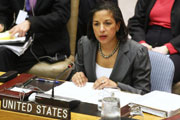
Rice urged the international community to preserve the unity of the protection of civilians in Libya 2011/5/4 Stressed the U.S. Ambassador to the United Nations, Susan Rice, the need for the international community remains united in its position on the situation in Libya in order to protect civilians and residential areas at risk and ending the violence against the Libyan people. At the meeting convened by the UN Security Council to discuss the situation in Libya and to hear testimony from the public prosecutor International Criminal Court, Rice said: "brought to the Attorney-General highlighted the actions of great concern made by the Libyan government and its security forces, including the incidents which fired forces Gaddafi fire on civilians The frequency of occurrence of torture, rape and deportation and forced disappearances and the use of cluster munitions and heavy weapons against civilian targets in densely populated areas and prevent the entry of humanitarian supplies. " Rice pointed to the international meeting tomorrow in Rome to discuss ways to support the political process that promotes the rights and aspirations of the Libyan people. She said that her country to connect with its allies and partners to examine the proposals and solutions to resolve the crisis. And confirmed U.S. Ambassador to the United States belief in the potential of the Libyan people and its need to share and support the leaders of their aspirations for freedom, democracy and dignity.
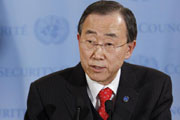
Secretary-General commends the role of women in Egypt and Tunisia in the demand for change and the rights and dignity 2011/5/4 Said United Nations Secretary General Ban Ki-moon said that women in Egypt and Tunisia and other countries were in the forefront in demanding change and the rights, dignity and opportunities. It is noteworthy that a significant portion of the speech, Mr. Ban at the meeting of high-level roundtable today under the title of democracy and equality between the sexes, has been focused on women in Tunisia and Egypt. He said that Tunisia was among the first Arab countries that granted women the right to vote in the late fifties, also achieved significant gains in the Tunisian areas of work and the parliament. He added: "The girls who grow up under these models, expecting that automatically Tguetvin Otherhn. Today, expect women Tunisia that are playing roles central to the success of the revolution, to get through their share of equitable authority, and decision-making, and enjoyment. Of course, there is still considerable distance on women that Iqtanha there, and in other places. " Then turned Mr. Ban to Egypt, pointing out that when I came out of women and girls in the demonstrations in Cairo's Tahrir Square in the International Women's Day, it was met by abusive and violence, and emphasized the possibility of changing that reality, and changing mindsets, adding that it was the responsibility of the United Nations to assist national actors in lead the process of transformation in societies. He said: "The Mall of the United Nations Fund for democratic oversight body in an effort to ensure the participation of women. For my part, I will continue to pressure the leaders to listen to the voice of their fellow citizens, all of their fellow citizens. In fact, during the last two months, the more I talked to the leaders in the region, not shorter at all to be reminded of and urged them to involve the leaders of women's groups. " The UN Secretary-General on the need for women to be an integral part of the emerging structures. Has been involved in organizing today's meeting of the International Institute for Democracy, and the Department of Political Affairs of the United Nations, the United Nations Development Programme, the United Nations Fund for Women.
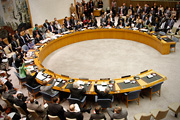
Nawaf Salam: the success of the Criminal Court in Libya will be a deterrent and a tool ring down the curtain on the stage of impunity 2011/5/4 Lebanese Ambassador to the United Nations Nawaf Salam concern about crimes committed by troops against civilians Gaddafi in Libya, adding that the Libyan leader has lost its legitimacy. The peace during a session of the Security Council on Libya today: "It still does not hesitate in the use of heavy weapons and cluster bombs against civilians. And increases our concern is what we have heard about these crimes by Ms. Navi Pillay, High Commissioner for Human Rights." Praised the peace actions carried out by the Office of the Attorney General of the International Criminal Court to investigate alleged crimes against humanity in the country, as well as the cooperation by States and organizations in this field, saying: "This cooperation represents a response to the UN Security Council Resolution 1973, a clear message from the international community to protect Libyan citizens from the abuses they have suffered since the Fifteenth of February last. " The ambassador stressed the importance of holding accountable those responsible for committing heinous crimes against the Libyan people are thirsty for freedom as he put it. He said his country welcomed the announcement public prosecutor of the International Criminal Court Luis Ocampo approaching readiness for arrest warrants for those responsible for crimes in Libya.
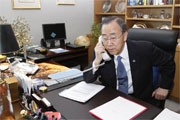
Ban Ki-moon urges Assad to make decisive reforms and to allow humanitarian groups access to the affected people 2011/5/4 Secretary-General held a telephone conversation this morning with President Bashar al-Assad in which he expressed concern at the humanitarian situation in the country, and invited him to allow humanitarian teams immediate access to the affected people to assess their needs. Spokesman for the Secretary-General Martin Nesirky briefed reporters today on the discussion of the parties when he said: "The Secretary-General to the three main points: first, that this is the time to take Ijrat decisive and bold political reforms. Secondly, he asked Syria to cooperate with the Committee of the Human Rights Council . III urged President Assad to allow humanitarian assessment team to inform the international community's concern on the humanitarian situation in Syria at this moment. " Secretary-General reiterated his call for an immediate end to violence and mass arrests of peaceful protesters in the Syrian Arab Republic, and conduct an independent investigation into the killings that occurred during the protests, including the killings of alleged military and security officers. Mr. Ban also stressed the need to meet the humanitarian needs of the population promptly, expressing its deep concern at the humanitarian implications of current developments in a number of Syrian cities.
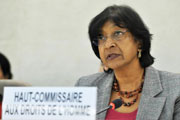
Pillay: Using Social Media in the Arab world, the newest way to expose human rights violations 2011/5/3 During an event organized in Geneva on the occasion of International Day for the freedom of the press, said the High Commissioner for Human Rights Navi Pillay today that the recent popular protests in North Africa and the Middle East are all about human rights. She pointed out that when you do not give people their rights and their voices are silenced, we must rise to those voices at some point to emphasize the rights. The Pillay: "The recent protests in North Africa and the Middle East are all about human rights: Economic, Social and Cultural Rights, as well as civil and political rights such as the right to true democracy, and the right not to be subjected to persecution by the state, and the right to freedom of expression and assembly." The High Commissioner for Human Rights that the media has paid a heavy price for their courage and persistent efforts to inform local citizens and the world events. She noted that with the end of April, killing four journalists in Libya, two in Bahrain and one each in Yemen, Egypt and Tunisia. The three others were killed in Iraq. She also said: "The journalists across North Africa and the Middle East are subjected to torture and other forms of violence, and mock executions and sexual assault. I have been intimidated, and to obstruct their work, and harassed and deported and detained arbitrarily, and also exposed to the disappearance. According to the Committee to Protect Journalists, there were at least for four hundred and fifty assault on journalists in this area alone since the beginning of the year. " Pillay pointed to the significant impact of new technology and applications of the Internet to spread information and expose the injustice and that by allowing individuals to exchange information and ideas instantly across national borders and are inexpensive. Pillay and commended the active use of social media in the region such as Facebook and Twitter, and harnessing cell phones to record and transfer video and SMS. Saying: "During the past two weeks, while the growing suppression of protests in Syria in more violent, often out what is happening on the ground there in the form of video clips posted on YouTube and after that drove the media's controversial of the country or was prevented from reporting on what occurs in the Syrian cities and villages affected. " Pillay and considered the means used brilliantly between young demonstrators in the Middle East and North Africa are effective tools to disseminate information and mobilize the population, and a way to keep the media informed of national and international developments in the region.
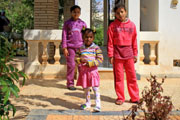
Fact-finding committee is preparing to submit a report on the human rights situation in Libya 2011/5/3 Commission concluded the Human Rights Council fact-finding mission to Libya after visiting several cities including Benghazi and Tripoli as well as Egypt and Tunisia. In Benghazi, the Commission visited the medical center and a hospital evacuated the city and met with more than thirty injured, authorities reported the need to treat all detainees in accordance with international standards. During its presence in Libya told us about the member of the Committee lawyer Asma Khader on allegations considered by the Committee, saying: "There are multiple forms and the variety of human rights violations in the current and prior periods which affect the right to peaceful assembly and expression and freedom of association, political parties, concerning the targeting of civilians by live ammunition and the use of prohibited ammunition in addition to the use of rape as an instrument of war. But all these facts that we collect will be subject to audit and scrutiny in the light of the provisions of international humanitarian law and international human rights law, international criminal court. " The Committee discussed with officials in Tripoli, the fate of a number of detained journalists, and provided a list of eighteen names to inquire about their whereabouts. Also addressed the Committee, in talks in the Libyan capital, to put eighty-six detainees at a detention center "new" for reasons related to the events witnessed by the country in February and March. The Committee met, the problem of three experts, a number of detainees and asked the Libyan authorities to release them on humanitarian grounds. The Commission will report on the results of its work to the Human Rights Council in Geneva at its next session in June, June, the U.S.
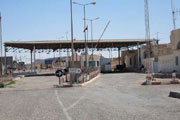
UNHCR: Thousands flee from Libya to Tunisia and more boats carrying fleeing to Italy 2011/5/3 Indicated that the High Commission for Refugees to the resumption of the movement of citizens to leave the mountainous region of western Libya after a brief interruption last week because of skirmishes between the forces of the Libyan government and opposition forces. Has reached more than five thousand people, mostly Berbers to the town of Dhibp southern Tunisia, most of them women and children. Said Adrian Edwards, spokesman for the UN High Commissioner for Refugees: "The deterioration of their status due to sandstorm violent hit the region. And seek the UN High Commissioner for Refugees struggling partners in order to preserve the surrounding camps. Has destroyed the capital, hundreds of tents, and two stores mobile." This was contested by the Libyan government forces and opposition forces to control the border crossing Aldhibp over the past week, and is subject to the control of the crossing is currently the Libyan opposition. The residents of the town Aldhibp expressed concern about the military activities across the border, and the fear of further clashes between the two sides. According to UNHCR, it would provide tents for local authorities in the case of whether there was a need to move some families away from the border area. According to UNHCR, the more people fled from Libya to Italy by sea, after about ten days from the cessation of travel by sea because of bad weather. He arrived in Lampedusa over the past five days, about three thousand and two hundred people, mostly from sub-Saharan Africa, bringing the total number of arrived in Italy since the twenty-sixth of the month of March last more than eight thousand, one hundred people. Also reached more than one thousand one hundred and thirty people to Malta by boat from Libya since the mid-April.
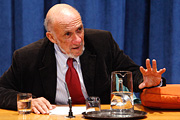
An international expert warns of the suffering of Palestinian children 2011/5/3 Falk Warned Richard Falk, Special Rapporteur of the United Nations on human rights in the occupied Palestinian territories of the deteriorating conditions faced by Palestinian children. This came at the conclusion of a visit carried out by Falk for eight days to Egypt and Jordan because it could not enter into the Gaza Strip and the West Bank and East Jerusalem. In an interview with UN Radio Falk said: "The task focused, in addition to considering the human rights violations, to collect information about the suffering of children in particular. The results most important is that in addition to the suffering of children from the effects of physical and clear as a result of the occupation and the long siege they also suffer from serious psychological problems from stress and anxiety and a lack of interest in life. " Falk said that the alpha and three hundred and thirty-five Palestinian children were killed by Israeli military operations and settlement in the occupied Palestinian territory occupied since 2000. Falk criticized the arrest of Palestinian children at night and at checkpoints and in the streets without their families usually know the charges against them. He pointed to the detention of two hundred and twenty-six Palestinian children in Israel, including forty-five between the ages of twelve and fifteen. Is scheduled to submit a report on the results of Falk's visit to the General Assembly of the United Nations later this year.
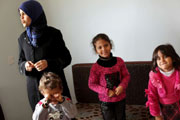
IOM calls on NATO and the Libyan authorities to allow its ship to dock in Misurata 2011/5/3 Appealed to the International Organization for Migration all parties to the conflict in Libya to allow the organization to ship to dock at the port of Misurata to be able to save about a thousand immigrants stuck in the city, violent and wide. The Gombe Omari Gombe WHO spokesman said that the appeal includes the North Atlantic Treaty Organization (NATO), said in a news conference in Geneva: "Today is especially important because there are many injured civilians and some are in intensive care, We've had reports that two of the those infected have died while they were awaiting their evacuation from the city, so we appeal to all parties of NATO and the Libyan authorities to allow the vessel to dock to be able to evacuate those persons there. " In response to questions from journalists Omari said that the vessel contacted the administrator of the Port of Misurata, who in turn contacted NATO to be able to allow the docking of the ship, but NATO has not yet issued the permit. It is noteworthy that the vessel (known as Red Star) off the coast of Misurata waiting since Saturday. For its part, the International Committee of the Red Cross said it hopes to be able to reach the town of Misurata in later this week to assess the ability of the population access to water and lack of medicine and electricity. The Commission has during the last weeks of the evacuation of more than two thousand and three hundred civilians from the city.
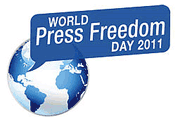
On World Press Freedom The United Nations says that the right of expression is critical in the digital age 2011/5/3 UNESCO chose the prisoner Iranian journalist Ahmad Zeid Abadi, to win the award for Guillermo Cano Press Freedom Day this year. Choose a genocidal came as the International Day for Press Freedom Day today. Abadi is an Iranian journalist was put in prison after the Iranian presidential elections in 2009. He is serving a six-year spans. Has been chosen for an independent international jury of twelve people from professionals in the media to be the winner of the UNESCO press freedom this year. The timing of the announcement of his victory did not come by chance, came ahead of World Press Freedom Day to emphasize the message that no limits or restrictions on the freedom of the press. Director-General of UNESCO, Irina Bokova supported the decision to choose Abadi, and appealed for his release and his ilk of journalists, she said: "I think that through this resolution, sent to the jury and I'm personally a message ... a courage, a defense of freedom of expression, regardless matter what the political circumstances in different countries. It is also the message that journalists should not be in prison because of their views. " Zeidabadi was among dozens of Iranian journalists who were arrested after the 2009 elections. In addition to the press last forty and a hundred pro-reform movement in the country, was tried on charges of conspiring to overthrow the government. He was sentenced to imprisonment for a term of six years followed by five years of internal exile, as well as to prevent him from exercising his profession as a journalist. Bokova said that the press has become one of the most dangerous occupations in the world. And the lives of those who are adamant in their right to freedom of opinion and expression is at stake in each place. She added: "Only during the past year we have witnessed the killing sixtieth journalists in all parts of the world. And most of them were not killed because of the major conflicts or on the battlefield as we say. But most of them local journalists; journalists who denounce corruption, or who owe some of the practices or illegal activities. this phenomenon that we are seeing is very disturbing. " World Press Freedom Day, which marks the third of May this year coincides with the twentieth anniversary of the signing of the Windhoek Declaration on freedom of expression. What is this ad? Bokova she explains: "It was a symbolic declaration that he was in the African continent, in a country coming out of a long period of dependency and lack of freedom. It was also symbolic because the journalists gathered themselves together, and adopted this declaration." Declaration of Windhoek is a statement of basic principles of freedom of the press and put journalists in Africa during the seminar of UNESCO on promoting independent and pluralistic African press in Windhoek, Namibia, twenty years ago. Has met with the support of this Declaration by the General Conference of UNESCO at its twenty-sixth in 1991. Hence, the General Assembly of the United Nations, in 1993 the third of May the World Day of Press Freedom. Since then, celebrate this day every year the anniversary of the Windhoek Declaration, which calls for an independent media, free and pluralistic society in all parts of the world.
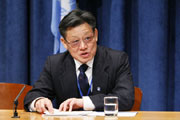
The start of the 19 th session of the Commission on Sustainable Development, which focuses on the challenges facing the development 2011/5/2 Started today at United Nations Headquarters in New York of the nineteenth session of the Commission on Sustainable Development, which will last over two weeks. In his speech at the opening meeting of this session, "said Sha Zukang Under-Secretary-General for Economic and Social Affairs that is of particular importance to this session for two reasons identified by the following:" First, it will cover a core set of topics related to the sustainable development agenda, and in particular, the Framework Programme, which runs over ten years, on sustainable consumption and production. Secondly, it will be the last session before the United Nations Conference on Sustainable Development in 2012, which is expected to be issued for important decisions, inter alia, decisions on the institutional framework for sustainable development. " Referring Zkang to last year's session of the meetings of sustainable development, which has been through review of five key areas for action, and said that the audit led to the identification of challenges and constraints that impede progress in these areas, the transport, nuclear waste management, mining, and the framework for work over the ten years on sustainable consumption and production. He added: "Globally, the consumption and production is sustainable threatens to overwhelm the absorptive capacity of the life support system. This imbalance is clear, whether measured by concentrations of greenhouse gases, or endangered species, or the rate of deforestation, or through declining fish stocks and so on. " The Under-Secretary-General for Economic and Social Affairs on the need to do more work in the world to pursue a comprehensive economic growth and sound, stressing the importance of intensifying efforts to promote sustainable development and meet the obligations of this generation to future generations.
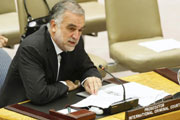
Continuing concern for the humanitarian situation in Libya and the flow of humanitarian aid more 2011/5/4 Confirmed attorney general of the International Criminal Court, Luis Moreno-Ocampo told the Security Council today that the preliminary results of an investigation into the occurrence of crimes against humanity in Libya for believing that he had been the commission of such crimes during the recent turmoil experienced in the country. Has informed the UN Security Council today on the preliminary results of the ICC investigation into allegations of crimes against humanity in Libya, said chief prosecutor Luis Moreno-Ocampo that this has already happened and is happening in the country. He pointed out that these crimes including murder, imprisonment or severe deprivation of physical liberty, and other inhumane acts, torture and persecution. Moreno Ocampo said: "Evidence suggests that security forces had systematically opened fire on peaceful demonstrators, following the same method in different locations. The evidence suggests that what happened in Egypt and Tunisia neighbors may pay the Libyan authorities to prepare for the possibility of demonstrations in Libya. It has been here since the beginning of January to bring mercenaries to Libya. " Ocampo added that the Libyan government's efforts to conceal those crimes have been difficult to know the real number of victims, but there is definite information that between five hundred to seven hundred people were killed in February alone. He also added: "It is difficult to count the number of dead because the bodies have been removed from the streets and hospitals. Not to allow doctors to document the number of wounded and dead. The security forces stationed in the hospital and arrested the wounded. The injured person was a sign that the opposition, and the challenge of authority is one of the crimes for the Libyan law. To avoid the risk and exposure to death, the ministry of some of the protesters wounded in the house, and did not send the dead or wounded to hospitals. " The Ocampo, in his speech to the exposure of citizens Libyans in Tripoli and the other for the persecution of the authorities and the detention, torture and killings, enforced disappearances, in addition to what he was subjected citizens Tunisians and Egyptians from the persecution and deportation to link their revolutions recently, pointing out that the destruction of mosques in which they reach them. He added: "There are specific allegations of war crimes including the use of inaccurate weapons such as cluster munitions and rocket-propelled multiple rocket launchers, mortars and other heavy weapons in densely populated areas, especially in Misurata. There are reports on the prevention of access of humanitarian supplies, and the use of civilians as human shields and torture of prisoners of war and civilians during armed conflict. " Ocampo asked judges to issue arrest warrants for three of the key officials for crimes against humanity committed in Libya since the Fifteenth of February last. But did not mention their names. The mandate of the International Criminal Court to investigate crimes against humanity in Libya came under Security Council resolution No. 1973. On the humanitarian level, the UN Office for the Coordination of Humanitarian Affairs said the humanitarian situation in some parts of Libya is still of concern. The bureau indicated that fighting continued in several locations in the country, including sites with high population density. Said Martin Nesirky United Nations spokesman in the daily press conference in New York: "There are still concerns with regard to civilians who are unable to access basic services, including clean water, medical care, and basic services, especially in and near areas where heavy fighting ". With regard to the situation in Misurata, the Office noted that it raised concerns in particular, are seeing heavy fighting continued for more than six weeks. In some parts of the city, the violence affected people's access to food, water and other basic materials, medical facilities also suffer from a lack of supplies and trained staff. Although, it has managed to relief agencies to deliver aid. Since the beginning of this month, docked in the port of Misurata more than a dozen vessels, and the unloading of three thousand tons of humanitarian aid, and evacuated about twelve thousand people. As it is today also the evacuation of a thousand other immigrants by sea, and the delivery of one hundred and eighty tons of food, water and supplies for children.
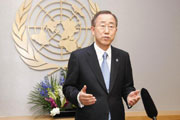
Secretary-General: Press Freedom of the most powerful means to expose governments that repress their people 2011/5/4 Said United Nations Secretary General Ban Ki-moon said he attaches great importance to the freedom of the press and on Article XIX of the Universal Declaration of Human Rights, which stipulates the right of all citizens to seek information, ideas and access to and transfer via any media, without any regard for borders. Came words of the Secretary-General during his participation in a panel discussion today on the occasion of World Press Freedom Day, held under the title: the media in the twenty-century atheist: new frontiers, and new barriers. Secretary-General said, stressing the importance of freedom of the press and the media: "When you suppress the governments of their people, the freedom of the press is one of the most powerful means to expose the methods. And when it is exposed citizens of discrimination, access to the media can give them a voice. In an era of pressing global challenges, the free exchange of information and ideas through the media can be linked to the citizens and States in the networks of common issues. " Mr. Ban pointed to demonstrations in the number of citizens of the countries of North Africa and the Middle East, demanding their rights and freedoms of democracy, relying heavily on new media, such as the Internet, social networking, blogging and more. He said in his speech: "enacted more than seventy countries laws to protect the right of citizens in different types of information, through the parliamentary procedures and the judiciary, the constitutional decisions and the like. We work for a day are not the governments are able to protect themselves from checking the full and appropriate" . In return for these advantages to the media and the new laws, the Secretary-General to the old challenges that remain, including the use of the media to spread hatred and incitement to violence. The discussions also dealt with the casualties among the workers in the media: "On World Press Freedom Day, we remember the journalists, editors and others working in the media who were killed because of their work. The impunity which is often followed these crimes indicates a lack of interest formal protection of journalists, and contempt for the vital role they play. There is a lot of other journalists languishing in prison only because they are performing their work. " The Secretary-General called the release of detained journalists, and pledged to bridge the gap digitization so that all citizens benefit from access to new media and communication technologies.
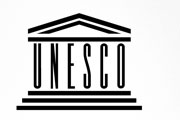
Kizona: a message of hope from UNESCO for school children in Japan 2011/5/4 UNESCO adopted the word Kizona as the title of a new campaign will be asked in which school children around the world to write words of hope on postcards for the children of Japan. Means Kizona Japanese ties of friendship or solidarity. The objective of this campaign to send a postcard to each child of the thousands of school children who are affected by the earthquake and tsunami that hit the north-eastern Japan in the tenth atheist last March, in the pause Tdman them. It is noteworthy that more than seven thousand schools have been severely damaged or completely destroyed by the tsunami, and these damages were concentrated mainly in the Tohoku region locked. In one of the many tragic situations experienced by the country, resulted in the tsunami killed more than seventy per cent of students in one school. The remainder came from the children of this school of psychological trauma, like thousands of children from other schools in the region. It also lost a lot of children and all they have been deprived of their parents and their friends and their home and their school. Is still a large number of children living in shelters. And UNESCO points out that the hope of sending a message or draw a picture symbolizing the friendship on a postcard to assure these children that the world has not totally forgotten them. According to the Director-General of UNESCO, Irina Bokova, in this regard that the word Kizona movement of a powerful message of solidarity as they reflect the strength of cooperation between UNESCO and Japan over the last sixty years. And expressed the conviction that the process of reconstruction and psychological rehabilitation should begin with education and schools, students and teachers. Branch will Japan's National Federation of UNESCO Associations collect postcards and distributed to school children and teachers in the region affected by the earthquake and tsunami. And would seek three educational institutions in the region to provide logistical support in the context of campaign Kizona.
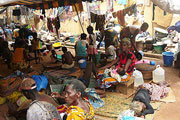
UNHCR refers to the improvement of the humanitarian situation in Côte d'Ivoire and the return of relief agencies to some areas 2011/5/3 Indicated that the High Commission for Refugees that the humanitarian situation in Côte d'Ivoire is still worrisome for the thousands of civilians in spite of improved security conditions in various parts of the country. UNHCR explained that with the enabling of its Working Group in the country to reach more of the displaced have demonstrated the great needs them. In Abidjan and the surrounding areas, UNHCR staff have regained access to the refugees, who were backed by the Commission prior to the interruption of operations. Said Adrian Edwards, spokesman for the Commission: "We have decreased the number of internally displaced persons who Sgelnahm of thirty-five thousand people by the end of March to fourteen thousand only last week. The living conditions are unstable, and people did not get enough food for weeks. In one of the positions in the Avukate Abobo, a priest told us that four displaced persons have died as a result of stress, including a boy of fourteen years of age. " UNHCR staff have met with thousands of IDPs who were forced to leave their homes in the north-west and west-central Côte d'Ivoire, in fifteen locations, and those who are staying with host families also suffering from shortness of life, and people have been living on one meal a day. Most of the displaced have expressed their desire to return to their places of origin as soon as possible. The town of Duékoué, will see slow improvement in conditions with the return of humanitarian agencies and relief to them. Edwards says: "It's still packed with the Catholic Mission compound at about twenty-seven thousand displaced people. UNHCR has resumed its work in the camp site in the village of Nihabli, which we hope will be completed within two weeks even hide the congestion in the church." Have been recorded about six hundred and fifty family names in the church Alcatholip for immediate return to their homes in the city and surrounding areas.
GIVE ME FREEDOM
The owner of this website has not logged in for more than 6 months.
Is this your website? Login here to remove this notice.
Or start your own website with N.nu: